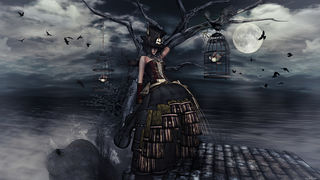Fear
Why Do We Love (and Hate) Feeling Scared?
Our endless fascination with horror and tragedy, explained.
Posted October 30, 2017

A monster is chasing someone. The person is terrified. You empathize. You feel their fear and your heartbeat escalates. You're only watching a movie, no reason to worry.
Still, why do we watch something we know will make us feel afraid? After all, most of us would agree that fear is unpleasant. Nobody wants to be chased by a monster in real life.
This is the paradox of horror.
The philosopher Berys Gaut describes the 3 aspects of the paradox:
(1) Some people enjoy horror fiction.
(2) Horror fiction often produces fear and disgust in the audience.
(3) Fear and disgust are intrinsically unpleasant emotions.
Why do people enjoy experiencing intrinsically unpleasant emotions? One explanation from Gaut is the evaluative theory of emotions. We have the ability to judge both the emotion we experience and the source of the emotion.
According to the evaluative theory, negative emotions are not naturally unpleasant. Rather, what we think about the source causing our emotions can create unpleasantness. Put differently, it is a mistake to think that an emotion alone is unpleasant. In fact, it is the emotion plus the source of the emotion that creates an unpleasant experience.
Negative emotion ≠ unpleasantness
Negative emotion + negative source producing the emotion = unpleasantness
For example, suppose a person learns that she must give a speech before a large audience. She feels fear. She may believe that the emotion of fear itself is inherently negative.
But the evaluative theory says the impending speech combined with the emotion of fear makes the situation unpleasant. This explains why the same person might feel fear as she reads a book about a character who is being chased, yet enjoys the story because she is able to discount the situation within the book—the object of the emotion.
Another explanation for the paradox comes from Katerina Bantinaki.
Batanaki argues that although fiction might cause unpleasant emotions, the overall experience can be positive. The consumption of horror fiction involves experiencing several mental states at once. She makes a distinction between two types of pleasure: affective pleasure and attitudinal pleasure.
Affective pleasure is caused by physiological states that produce or increase positive emotions.
Attitudinal pleasure is more nuanced, related to the forecasting of our goals and desires. It results from approval toward a situation or state of affairs, even if the situation does not involve emotional pleasure.
When encountering horror fiction, we experience fear in a safe environment. Throughout the experience, we learn to cope with a negative emotion. Our ability to navigate and overcome an unpleasant experience is an attitudinal pleasure.
Moreover, Bantinaki says, “Fear makes us feel alive.” When we encounter horror fiction, we experience a state of arousal—elevated heart rate, focused attention, and a sense of living in the moment that we would not otherwise feel without the cost of being in a high-stakes situation with real danger. The pleasure we experience from a state of heightened arousal and approval of our ability to sit through the situation outweighs the unpleasantness resulting from the emotional experience.
Horror fiction allows us to live in the moment, our attention focused only on the current experience. It provides the benefits of fear with none of the costs.
Then there’s the richness of experience idea. Rich experience theorists say pleasure is not the only reason to do things. Instead, sometimes people seek certain forms of fiction for the experience. We like novelty. The rich experience theory proposes that one part of the reason we seek tragic or frightening experiences in fiction rather than in real life is cowardice.
We don't want to actually fear for our lives. But for a small price, we can experience a taste of such an experience, and a dash of the associated emotions, by watching a horror film.
Horror and tragedy offer a cognitive, rather than an emotional, pleasure. These genres get us to think about what we would do if we experienced a situation similar to the fictional characters. Armed with the understanding that the object of our emotions is not a real threat, we are more willing to let an emotion consume us. In the case of fiction, we do not have the pressure of knowing we must deal with a dangerous or tragic situation in real life.
And there’s yet another layer to our enjoyment of negative emotions produced by fiction. University of London philosopher Stacie Friend argues we can enjoy tragedy on a meta level. When we consume fiction, we appreciate the work itself and the emotions it provokes in us. But we also recognize the thoughtfulness of those involved with the creation of the story.
We appreciate the story on a deeper level by thinking about the cleverness of the creators. We can appreciate a movie not only for the plot but also for the talent of the actors. Unlike our everyday lives, every detail in a story has been thought up in the minds of others. The understanding that our emotions have been aroused by the craftsmanship of writers and artists adds to the rich experience when viewing or reading fiction.
Our emotional lives cannot be boiled down to the simple idea that some emotions are always bad and others are always good.
We are more complex than that.
Follow Rob on Twitter here: @robkhenderson.
References
Bantinaki, K. (2012). The paradox of horror: Fear as a positive emotion. The Journal of Aesthetics and Art Criticism, 70(4), 383—392.
Friend, S. (2007). The pleasures of documentary tragedy. The British Journal of Aesthetics, 47(2), 184-198
Gaut, B. (1993). The paradox of horror. Arguing About Art: Contemporary Philosophical Debates, 317-329.




